
Equine veterinary technicians play a crucial role in the care and treatment of horses. They work alongside veterinarians to provide medical support, assist with procedures, and ensure the well-being of these majestic animals. A day in the life of an equine vet tech is dynamic, challenging, and incredibly rewarding. Let's take a peek behind the scenes to see what it's like to work in this exciting field. You can also browse around this site to explore more about equine vet tech.
Job Responsibilities
Medical Care
- Assist veterinarians with physical exams, vaccinations, and other medical procedures
- Administer medication and treatment as directed
- Monitor vital signs and assess overall health of horses
Diagnostic Imaging
- Prepare horses for X-rays, ultrasounds, and other diagnostic tests
- Operate imaging equipment and assist with capturing images
- Ensure proper positioning of the horse for accurate results
Typical Day
A day in the life of an equine vet tech is filled with a variety of tasks and responsibilities. Here's a glimpse into what a typical day might look like:
Morning Routine
- Arrive at the clinic or barn and prepare for the day ahead
- Review the day's appointments and set up any necessary equipment
- Assist with morning feedings and check on any hospitalized horses
Medical Procedures
- Assist with scheduled appointments for routine exams and vaccinations
- Prepare treatment areas and assist with minor surgeries or procedures
- Keep detailed records of treatments, medications, and patient progress
Emergency Response
- Be prepared to assist with any emergency cases that come in throughout the day
- Provide immediate care and support to injured or distressed horses
- Work quickly and efficiently to stabilize the animal until the veterinarian arrives
Challenges and Rewards
Challenges
- Long hours and physically demanding work
- Dealing with high-stress situations and emergency cases
- Emotional toll of working with sick or injured animals
Rewards
- Building strong relationships with horses and their owners
- Making a difference in the health and well-being of animals
- Being part of a dedicated team that is passionate about equine care
Education and Training
Becoming an equine veterinary technician requires specialized education and training. Most vet techs complete a two-year associate degree program that includes coursework in animal anatomy, medical terminology, and veterinary procedures. Some may also choose to pursue additional certification or training in equine care.
Skills and Qualities
- Strong communication and interpersonal skills
- Attention to detail and the ability to follow directions precisely
- Physical fitness and the ability to work in a variety of weather conditions
Continuing Education
- Attend workshops, seminars, and conferences to stay current on the latest advancements in equine medicine
- Seek additional certifications or specializations to enhance career opportunities
- Participate in on-the-job training and mentorship programs
Conclusion
Being an equine vet tech is a challenging yet fulfilling profession. These dedicated individuals play a crucial role in ensuring the health and well-being of horses and are valued members of the veterinary team. From assisting with medical procedures to providing emergency care, equine vet techs make a lasting impact on the lives of both animals and their owners.